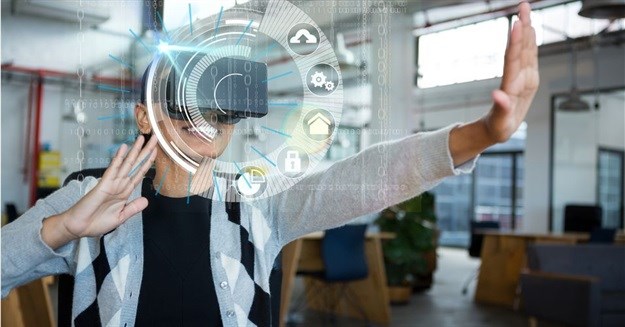






AI and the digitally transformed workplace
AI is closely tied with the evolving digital workplace. Routine tasks are increasingly automated, giving rise to new digital transformation realities in many organisations. But is AI a threat or an opportunity? That depends on which outlook you prefer. By 2025, machines will perform more current work tasks than humans (based on research from the World Economic Forum titled The future of jobs 2018). But it is also forecast that the rapid evolution of machines and algorithms in the workplace could create 133 million new roles in place of 75 million that will be displaced between now and 2022.
Aside from potential labour market shifts, AI could become a bottom-line business imperative. Companies are evaluating the potential of AI to accelerate their businesses through creating efficiencies or boosting the productivity of their workforce. According to study by Accenture, AI could boost average profitability rates by 38% and lead to an economic increase of $14tn by 2035. These boosts would come from efficiencies like the accelerated development of new products, increased innovation and the generation of new revenue streams. But it’s not just AI that contributes to this new business landscape - us humans play an important role too.
There are many misconceptions about AI, like the Terminator-type world view where machines take over. But this is a myth. There will always be work that people do better. Humans possess ingenuity that machines just cannot replicate. We learn and grow through both cognitive learning or IQ but also emotional intelligence or EQ. AI is used more for identification, image or pattern recognition and therefore involve more of the cognitive aspects of learning. There are other areas of our human capacity, like personal development, creativity, as well as the capability to manage and motivate teams that will always require our ingenuity.
AI is fueled by three main ingredients: data, networks, and algorithms.
First, data has become arguably the most important currency in modern history. And the scale of data is growing. It is estimated that 80% of the world's data has been generated in the last two years. For example, billions of user authentications take place monthly across hundreds of millions of devices, with signals that span personal and professional realms. With all this data comes opportunity for organisations to pull these data signals together to deliver unique experiences for information workers.
Second, networks are required to process this data and make the connections. High-speed mobile internet and cloud technology are set to spearhead this data processing and deliver AI powered experiences. Modern data networks span the globe, meaning the data processed and patterns recognised make AI machines infinitely smarter the more data is fed to them. These AI networks connect people, content, location and other data sources to service their customers better and optimise productivity and serve better insights.
And finally, algorithms allow companies to create unique AI experiences. Over time, algorithms have changed the world. Search indexing and pattern recognition, both algorithms, have influenced productivity breakthroughs as small as being able to find a document or as large as the latest innovation in genomics. But while this all may sound like science fiction, these experiences are already making their way into how we work every day.
Many of us already use AI without knowing it. If you have ever leveraged a virtual assistant to find directions, browsed weather apps, read online movie suggestions, used a voice command, it is most likely powered by AI. I read a great quote recently that said
If it is written in python, it is probably machine learning, if it is written in PowerPoint, it is probably AI.
Now let’s break down AI into 5 common scenarios in which it has potential to change personal productivity for information workers:
When it comes to our personal productivity, AI unlocks opportunity for us to augment our human capacity and focus on, well... just being human.
AI has the potential to amplify our creative capacity, to help us to find the information we need, when we need it, stay on top of our personal and professional lives, make us better communicators, unearth information and insights that otherwise would have missed and also make sure that we have a more inclusive workplace.
When it comes to productivity and AI, it is not as much a scenario of humans vs machines, but more of humans plus machines vs the problem.
